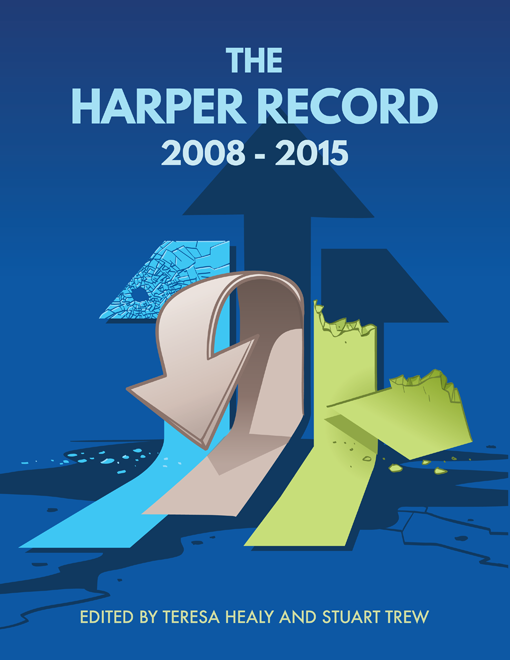This is an archive of news stories and research from the National Union of Public and General Employees. Please see our new site - https://nupge.ca - for the most current information.
From the economy to the environment, social programs to foreign policy, health care to tax cuts, the tar sands to free trade deals, and many other areas, the 36 contributors to the book detail the facts and key moments of the 40th and 41st parliamentary sessions.
 Ottawa (7 Oct. 2015) — The Canadian Centre for Policy Alternatives (CCPA) has released The Harper Record 2008-2015, a detailed account of the Conservative government’s economic, environmental, social, foreign policy and democratic records through the 2008 crisis, Great Recession, and ongoing economic recovery.
Ottawa (7 Oct. 2015) — The Canadian Centre for Policy Alternatives (CCPA) has released The Harper Record 2008-2015, a detailed account of the Conservative government’s economic, environmental, social, foreign policy and democratic records through the 2008 crisis, Great Recession, and ongoing economic recovery.
Extensive look at the record
From the economy to the environment, social programs to foreign policy, health care to tax cuts, the tar sands to free trade deals, and many other areas, the 36 contributors to this book detail the facts and key moments of the 40th and 41st parliamentary sessions.
According to editors Teresa Healy and Stuart Trew, if there is a prominent crosscutting theme in The Harper Record it is how the 2008 global financial crisis acted as a cover of sorts for the government’s plans to restructure the public sector, cut public services, deregulate industry, dismantle environmental protections, reform Canada’s immigration system, and undermine parliamentary democratic processes.
Book outlines worrisome trends in federal politics
“Together, the chapters in this book paint a picture of a government that weakened its ties to Parliament, narrowed its relationship with civil society, exerted strategic control over inter-governmental relations and negotiations with First Nations, rejected scientific and expert knowledge in the interest of pursuing more partisan economic and social policy objectives,” says Healy.
“In each case we see the importance of the 2008 financial crisis to achieving the government’s objectives: from stimulus to austerity, there is an organic connection between the government’s response to the Great Recession and its systemic transformation of the role of the Canadian state.”
CCPA tradition of taking a critical look at government policy
This book, which builds on the 2008 collection The Harper Record, continues a 25-year tradition at the CCPA of examining the records of Canadian federal governments from Mulroney through Chrétien and Martin to the current Harper government. Contributions cover First Nations, the increased racialization of immigration policy, Canada’s growing reliance on temporary foreign workers, budgeting shifts away from social policy toward security and energy ministries, national security measures including Bill C-51, the dismantling of the Canadian Wheat Board, the closure of public libraries, and much more.
“Regardless of the election outcome, in detailing what the Conservative government achieved over these last two parliamentary sessions, the book’s contents will continue to be relevant to policy makers, activists, historians, journalists and the public for many years to come,” says Trew.
More information:
NUPGE
The National Union of Public and General Employees (NUPGE) is one of Canada's largest labour organizations with over 360,000 members. Our mission is to improve the lives of working families and to build a stronger Canada by ensuring our common wealth is used for the common good. NUPGE
